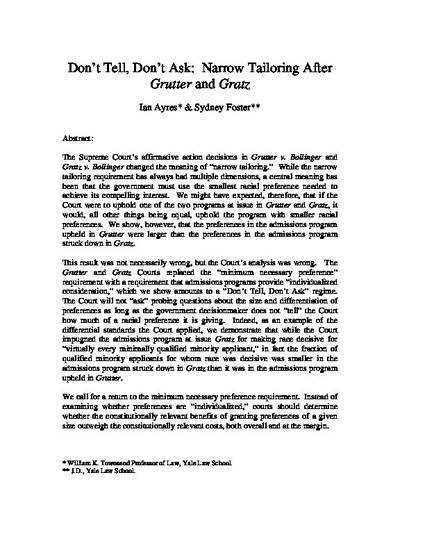
Other
Don’t Tell, Don’t Ask: Narrow Tailoring After Grutter and Gratz
John M. Olin Center for Studies in Law, Economics, and Public Policy Working Papers
Abstract
The Supreme Court’s affirmative action decisions in Grutter v. Bollinger and Gratz v. Bollinger changed the meaning of “narrow tailoring.” While the narrow tailoring requirement has always had multiple dimensions, a central meaning has been that the government must use the smallest racial preference needed to achieve its compelling interest. We might have expected, therefore, that if the Court were to uphold one of the two programs at issue in Grutter and Gratz, it would, all other things being equal, uphold the program with smaller racial preferences. We show, however, that the preferences in the admissions program upheld in Grutter were larger than the preferences in the admissions program struck down in Gratz.
This result was not necessarily wrong, but the Court’s analysis was wrong. The Grutter and Gratz Courts replaced the “minimum necessary preference” requirement with a requirement that admissions programs provide “individualized consideration,” which we show amounts to a “Don’t Tell, Don’t Ask” regime. The Court will not “ask” probing questions about the size and differentiation of preferences as long as the government decisionmaker does not “tell” the Court how much of a racial preference it is giving. Indeed, as an example of the differential standards the Court applied, we demonstrate that while the Court impugned the admissions program at issue Gratz for making race decisive for “virtually every minimally qualified minority applicant,” in fact the fraction of qualified minority applicants for whom race was decisive was smaller in the admissions program struck down in Gratz than it was in the admissions program upheld in Grutter.
We call for a return to the minimum necessary preference requirement. Instead of examining whether preferences are “individualized,” courts should determine whether the constitutionally relevant benefits of granting preferences of a given size outweigh the constitutionally relevant costs, both overall and at the margin.
Date of Authorship for this Version
9-1-2005
Disciplines
Citation Information
Ian Ayres and Sydney Foster. "Don’t Tell, Don’t Ask: Narrow Tailoring After Grutter and Gratz" (2005) Available at: http://works.bepress.com/ian_ayres/10/
